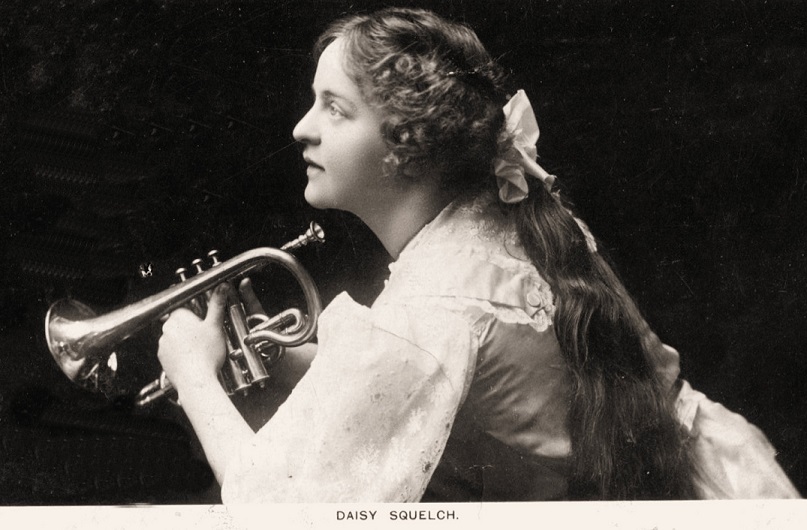
What’s in a name?
Marion Morrison, Norma Jeane Mortenson, Reginald Dwight and Greta Lovisa Gustafsson all found fame after changing their identity.
The world was to know them better as John Wayne, Marilyn Monroe, Elton John and Greta Garbo.
‘True Grit’ starring Marion Morrison or Reg Dwight as ‘Rocketman’ would never have had quite the same ring.
Perhaps global fame would have come the way of Agnes Mary Squelch if she had really felt the need to rid herself of her onomatopoeic surname.
Instead, she was happy to be called ‘Daisy’ Squelch - ‘Champion Lady Cornetist of the World’.
Perhaps global fame would have come the way of Agnes Mary Squelch if she had really felt the need to rid herself of her onomatopoeic surname.
Champion of the World
Born in 1885 in Saltaire, the Squelch family moved to Blackpool where her music loving parents ran a boarding house. The youngest of four children, her older brother Fred was a professional musician and Daisy was taught piano.
However, she had the desire to take up another instrument, and in 1899 she started taking lessons with an old family friend - the great John Paley.
Rare talent
Paley, who was principal cornet of Black Dyke Mills Band from 1883 to 1901 soon realised that Daisy was a rare musical talent.
Withing two years she had given her first public performance in Blackpool and in the 1901 census, whilst her brother Fred was referred to as a ‘Professor of Music’, Daisy was listed as being a ‘musician/solo cornetist’.
Soon she was taking part in the emerging (and lucrative) solo contest circuit playing against the likes of a young Edwin Firth, who went on to become principal cornet of Foden’s.
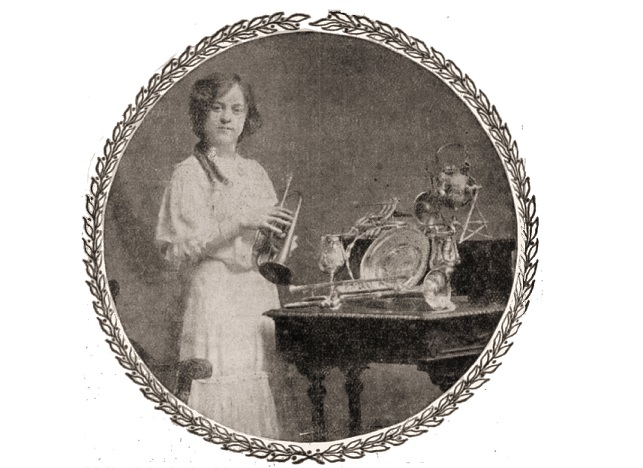
Daisy in 1906
Making her mark
Her playing certainly made its mark: Her performance in coming fourth at a contest in Workington in 1903 simply recording the adjudicator’s remarks about her ‘heavy tone’ in ‘Give Me Back My Heart Again’ in what was called ‘a most praiseworthy performance’.
However, with money to be made an opportunistic entrepreneur ensured that extra interest in her performances could be engineered by offering the challenge to any other ‘lady cornetist’ to perform against her for a prize of £500 (over £40,000 today).
Marketed as ‘the finest lady cornetist in the world’ she was soon in demand as a soloist, especially as the novelty element of her gender was quickly forgotten when she began to play. In a concert in Shipley in Yorkshire in 1903 conducted by Paley she played ‘The Lost Chord’, ‘The Arbucklenian Polka’ and ‘Killarney’ as an encore.
Opportunistic
However, with money to be made an opportunistic entrepreneur ensured that extra interest in her performances could be engineered by offering the challenge to any other ‘lady cornetist’ to perform against her for a prize of £500 (over £40,000 today).
It was a clever wheeze, as Daisy would readily perform ‘Fantasia Concertante’ (Weber) or ‘Fairy of the Waters’ (St. Jacome).
She was never officially challenged.
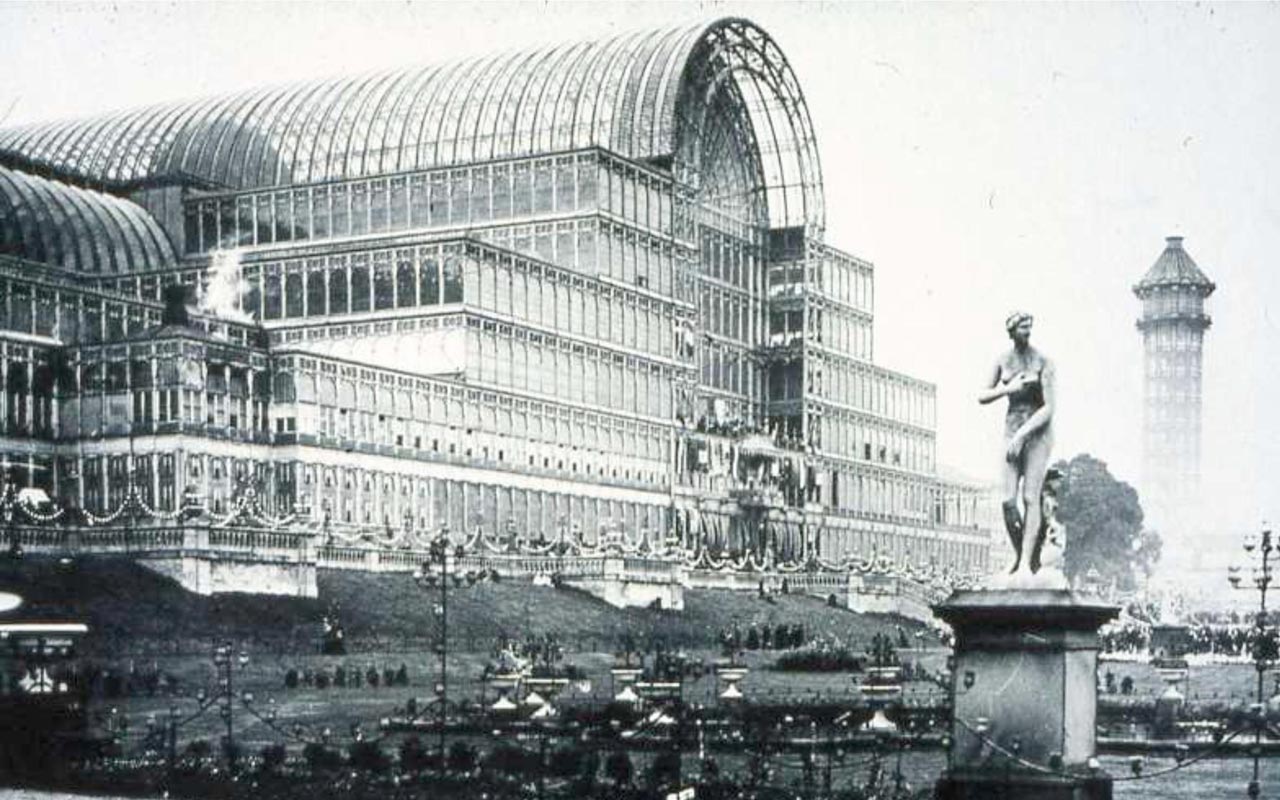
20,000 people watched Daisy play at Crystal Palace in 1905
20,000 people
Instead, the following years were to provide her with a platform to perform to huge audiences – especially at the Crystal Palace in London, home to the National Championships.
In 1905, alongside attractions such as Madame Ella Zuila ‘The Lady Champion High Wire Walker’, the Electric Cave of Mysterious Floors and Aquatic Burlesques and ‘The Wild Animals of Somaliland’, Daisy performed 'The Lost Chord' before the announcement of the results.
Conducted by John Henry Iles it was later reported that an audience of “some 20,000, with a further 5,000 turned away at the doors” heard her play.
Later she returned to perform in the evening concert, adding ‘Fairy of the Waters’ to ‘The Lost Chord’ to show ‘in direct contrast’ as the programme noted, ‘her powers of execution’.
Conducted by John Henry Iles it was later reported that an audience of “some 20,000, with a further 5,000 turned away at the doors” heard her play.
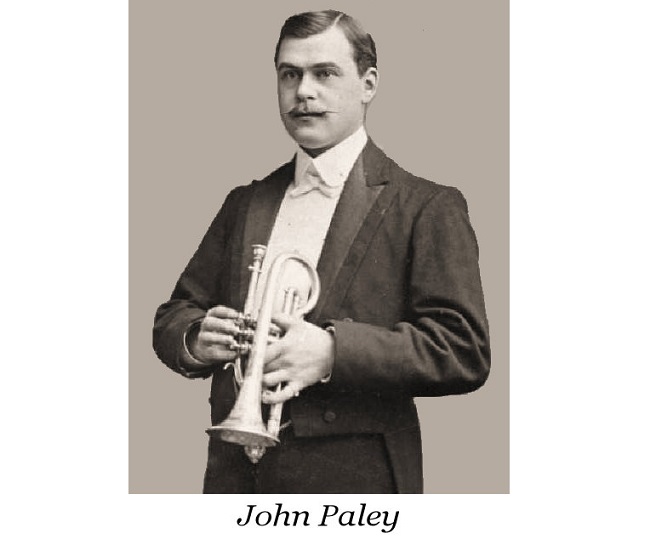
Daisy's mentor John Paley
Solo reputation
Daisy now travelled far and wide - from Scotland and back to Bradford on one weekend, followed by Workington, Sheffield, Sutton, Burnley and Bolton, where in 1906 she was a guest soloist with the all-conquering ‘Double Champions’ Wingates Temperance.
She also continued to put her solo reputation on the line against the likes of Edwin Firth and Arthur Laycock, two of the emerging star performers of the age - beating them both on occasions, as well as once topping the field against 25 male competitors.
As well as brass bands she performed with other ensembles such as the Yorkshire Hussars and the Mexborough Concertina Prize Band where she played ‘Carnival of Venice’ (Arban) and ‘Fantasie on Weber’s Last Waltz’ (Hock).
She also continued to put her solo reputation on the line against the likes of Edwin Firth and Arthur Laycock, two of the emerging star performers of the age - beating them both on occasions, as well as once topping the field against 25 male competitors.
Extensive repertoire
Her repertoire was extensive; from favourites such ‘The Lost Chord’ and ‘Fairy of the Waters’ to ‘O Dry Those Tears’, ‘I’ll Sing Those Songs of Araby’, ‘Kathleen Mavoureen’, ‘Sing Me To Sleep’, ‘Sweet Spirit, Hear My Prayer’ and the duet ‘Ida & Dot’.
Around this time it was reported that she had been asked to tour America. She had indeed had several invitations, but refused them all. What would the future have been had she taken the opportunity?
Worthy of reporting
By 1909 even her local ‘Blackpool Gazette & Herald’ found her fame worthy of reporting.
“Miss Squelch is quite an idealist in the matter of cornet playing,” the writer rather pompously declared.
“Properly handled, she strongly urges the cornet as a pleasing instrument for ladies, and she intends, as far as she can, to popularise it, and also to popularise the right kind of music.”
America
And whilst acknowledging her successes and “extensive concert platform experience” as well as her refusal of “several offers to go to America”, it rather played out the Edwardian stereotypes of womanhood by adding that “Miss Squelch has accepted her successes with the most charming complacency, and it was with difficulty that one overcame her natural modesty and diffidence to talk about her conquests.”
However, another report added: “She does not desire her playing to be criticised from the fact of her being a female performer, but for the playing of the instrument itself, irrespective of the sex of the performer.”
However, another report added: “She does not desire her playing to be criticised from the fact of her being a female performer, but for the playing of the instrument itself, irrespective of the sex of the performer.”
And so, Daisy continued to perform at leading venues around the country – from Manchester Hippodrome to Huddersfield Town Hall where in 1909 “she received an enthusiastic recall from parts of the hall, members of the band included, and the gifted cornetist came back and acknowledged the compliment.”
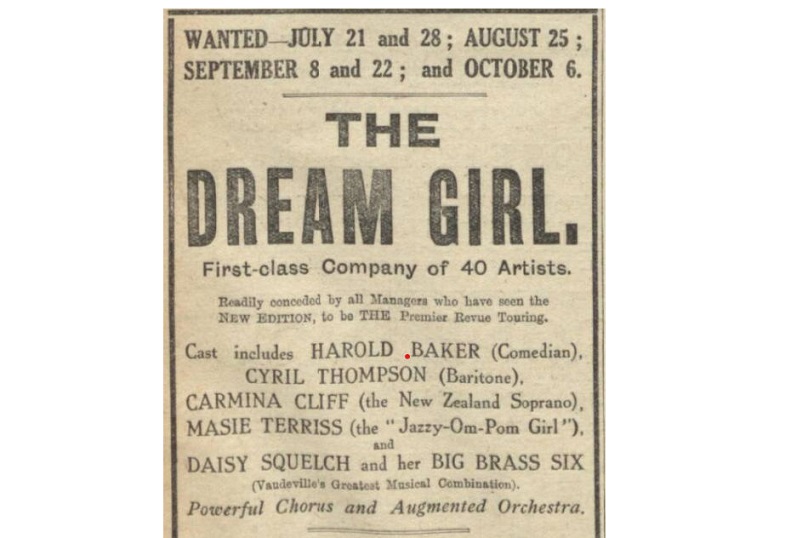
The Dream Girl
Fresh turn
In 1912 her career took a fresh turn when she joined nine male brass performers, six of whom were expert trombonists as the ‘Big Brass Ten’.
Described as providing a ‘gargantuan feast of melody’ from operatic to ragtime music, it was a huge success - heading the bill at the Birmingham Hippodrome, Dublin’s Theatre Royal and the Victoria Palace Theatre, London.
One reviewer said: “Miss Squelch in her solos showed that she was an artiste of rare skill, and her conception of the composers’ ideas indicated her ability as a faithful interpreter.”
South Africa
And whilst she never travelled to America, she did perform in South Africa in 1913, where in an interview in the Johannesburg Sunday Times she neatly deflated the reporter’s patronising enquiry.
However, asked if she ever felt exhausted by playing she simply replied: “Oh dear, no”, before adding with pointed effect that she had a repertoire of over 80 solos.
“One can picture the little maid, with her hair of sunny gold, standing in front of the serried ranks of the finest wind instrumentalists of the world, producing those wonderful tones which have placed her in the foremost ranks of musicians,” it read, before adding “It must have been a triumph to woman's power!”
However, asked if she ever felt exhausted by playing she simply replied: “Oh dear, no”, before adding with pointed effect that she had a repertoire of over 80 solos.
Marriage
In 1913, Daisy Squelch married Joseph Turner Morrison in London – her husband a member and promoter of her ‘Big Brass Six’.
In the short period before the First World War the ensemble toured extensively adding players and additional repertoire as appropriate. In 1914 Daisy renamed her ensemble as the ‘Patriot Band’ and included ‘Britannia’s Realm’ as a new scene in their performances as they played for audiences from Glasgow to Pontypool made up of civilians as well as troops – many home from the Western Front.
Later she led her new comedy musical revue called ‘The Dream Girl’, described as a ‘reverie in seven dreams’ and renewing a link to the brass band world with its Musical Director Angus Holden, who led Hebburn Colliery Band to win the 1904 National title.
Dream Girl
It was a hit - a reviewer for the Leicester Evening Mail, saying that it “delighted everyone” and that, “a much applauded feature is Daisy Squelch's brass band, which plays some popular selections in dashing style.”
Other reviewers noted her playing too: “Miss Daisy Squelch, whose cornet solos form one of the great attractions of the performance, plays with greater mastery of her instrument than ever”, said one, whilst another said: “Miss Squelch plays cornet solos with variations in brilliant style, and earned vociferous recalls.”
Post War return
The touring was incessant though: Liverpool, Newcastle, Middlesbrough, New Brighton, Wakefield, Mansfield, Nuneaton, Guildford, Swindon, Bath, Gloucester, Pontypridd, Merthyr, Leeds.
‘Dream Girl’s’ run continued until the end of the Great War. Finally, Daisy took a break – returning in 1920 with an equally busy schedule.
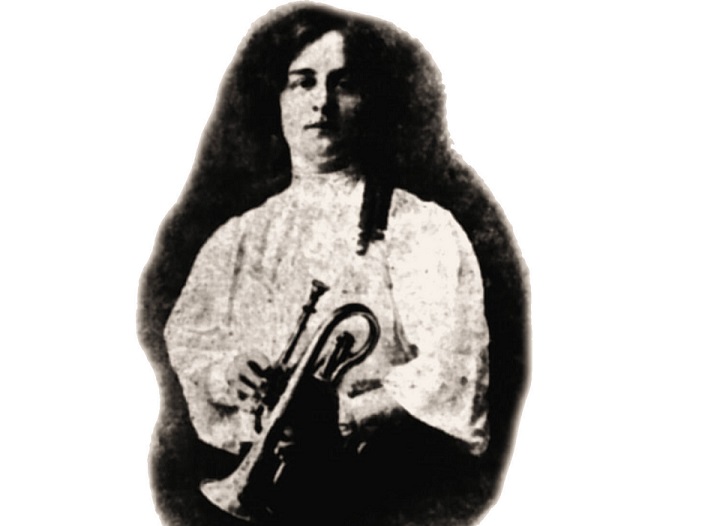
Daisy in 1919
Brilliance
With her husband she set up a new revue entitled ‘The Romany Maid’, based on a script by H. Kenneth Barton. Now living in Manchester she advertised for personnel for a show with “her famous brass band” that she said was full of “magnificent scenery, gorgeous dresses, and a full chorus of ladies and gentlemen”.
It opened in 1921 and set off on tour once more with reviewers calling it, “an entertaining little production” whose “best bits” were the “delightful rendering by Miss Daisy Squelch's brass band”.
It opened in 1921 and set off on tour once more with reviewers calling it, “an entertaining little production” whose “best bits” were the “delightful rendering by Miss Daisy Squelch's brass band”.
The South Yorkshire Time said; “Miss Squelch displays all her well-known brilliance on the cornet and the French horn,” whilst the Burnley News added: “Miss Squelch's inclusion of a brass Sextette in a revue is a novel feature which adds to the drawing power of the production.”
Over the next year or so the showed continued its progress before it was cancelled in mid-June 1922, for an unknown reason, with the various artists suddenly seeking new engagements.
Obscurity
Perhaps Daisy, now aged 36, had become exhausted, or more likely, the appetite from audiences had waned. Whatever the reason, she no longer toured, her name quickly disappearing into historical obscurity.
There was to be no final celebratory curtain call.
In 1944 her husband died. They had no children, and Daisy outlived him in quiet anonymity until she too passed away without any media interest in 1965, her remarkable achievements long forgotten.
No longer though – and thanks to some wonderful research by Gavin Holman her pioneering achievements can be marvelled at once more.
What’s in a name you may ask?
With Agnes Mary ‘Daisy’ Squelch – a great, great deal in fact.
Iwan Fox
With specific thanks to Gavin Holman who has undertaken extensive research on the subject and kindly allowed permission to use his work for the article.
To find out more about Gavin's work go to: http://www.ibew.org.uk/misc102.html













